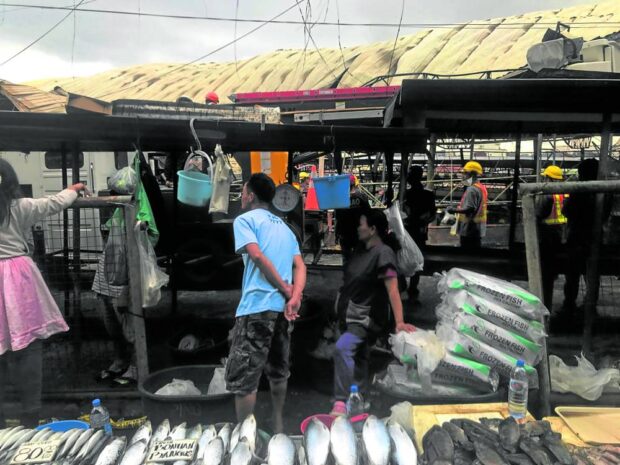Cleanup of debris from fire-hit Baguio market starts

BUSINESS AS USUAL | Fish vendors tried to keep it business as usual on Monday, setting up stalls just outside of the section of the Baguio City Public Market, which was hit by fire last week.
(Photo by VINCENT CABREZA / Inquirer Northern Luzon)
BAGUIO CITY, Benguet, Philippines — Parks and market streets in the summer capital are being eyed as temporary selling areas for vendors affected by the huge fire that hit the Baguio market over the weekend, just as the city government, aided by government crew and volunteers, began a massive cleanup that was expected to be completed in a week.
On Monday, city workers began dismantling the burned metal roof of the Block 3 building at the Baguio City Public Market, a tourist destination in the city, while vendors, civic groups, and students volunteered to haul out debris from the stalls that were razed by the fire.
Mayor Benjamin Magalong said he wanted Block 3, which was only partly burned by the fire, to open for business within a week to cushion the financial and social impact of the fire that broke out before midnight on Saturday and was only completely doused at around 5 a.m. on Sunday.
Residents, city hall employees, vendors, police officers, soldiers, and even student activists have signed up for volunteer cleanup duties at Block 3. The fire was believed to have originated in the neighboring Block 4 building, which was totally destroyed. The two blocks sell vegetables, fish, and assorted nonfood items.
In an interview, Magalong said the city should expect “an extensive cleanup drive for the next seven days while simultaneously restoring stalls.”
“We need to restore market operations [immediately]. It’s an ambitious undertaking. We would like to push ourselves to the limit so we can bring back the livelihood of our vendors,” the mayor said, adding that it was only Monday, “but we all hit the ground running.”
He said the fire destroyed more than a fourth of the 3-hectare-wide market and could have affected 1,700 of the market’s 3,900 vendors.
Vendors affected by the fire set up shop along market streets to get by for the day, although they have been given access to funds saved for a market redevelopment project by their organization, the Baguio Market Vendors Association.
Public parks were also being considered by the city government as temporary sites for selling vegetables, fruits and fish to help displaced vendors until Block 3 is reopened, the Inquirer learned.
Many residents and tourists still visited the market on Monday, although some spent time looking and taking “selfies” at the fire-damaged buildings.
The market, one of Baguio’s most valuable pieces of government real estate, has been operating since 1913, four years after the summer capital was declared a chartered city by the American colonial government.
The market was damaged when American bombers flattened Baguio toward the end of World War II, but the original “stone market” was destroyed by fires in the late 1960s and early 1970s.
Huge fires also struck the market in the 1990s and in 2009. The 2009 blaze also happened at night, like the March 11 fire, and occurred days after Baguio had concluded its annual Panagbenga Flower Festival.